Standard Bank admitted over the weekend that its Fraud Centre erroneously labelled two proof of payment documents the EFF had sent to AfriForum as “fraudulent”. The bank formally characterised this stunning lapse of judgement as a “misunderstanding” and neglected to point to the Fraud Centre as the spark in the powder keg.
Indications are that the “misunderstanding” is self-created. Standard Bank’s business unit for the past eight years generated pay alerts on forms with a letterhead listing directors who had resigned in 2015 in conjunction with an outdated company logo in the top left corner.
Standard Bank’s apology acknowledged “that the bank used outdated templates in isolated incidents”. This seemed to have been a major indicator to the bank’s Fraud Centre that the proof of payment could not be legitimate. Scorpio’s investigation suggests the sending of outdated templates from 2015 was not as “isolated” as Standard Bank makes it out to be.
The incident raises questions South Africa can ill afford at a time when the government is trying to prove to the global financial crime watchdog, the Financial Action Task Force, that banks and law enforcement agencies in SA are not as terrible at catching fraud, corruption and money laundering as its members made them out to be.
How the saga began
The background to this story is that the EFF’s Sandton-based legal firm Ian Levitt Attorneys sent two proof of payment notifications to AfriForum’s lawyers Hurter Spies Inc in Pretoria on Monday, 6 November. The EFF owed AfriForum R316,000 in legal costs after losing a land invasion case with costs. On the same day, AfriForum’s attorney Daniël Eloff and AfriForum CEO Kallie Kriel published the proof of payment documents on social media.
Sharp-eyed Khaya Sithole, a chartered accountant, radio host and lecturer, noticed something was wrong with the list of Standard Bank directors printed at the bottom of the proof of payment documents. The former joint chair of Standard Bank, Fred Phaswana, Sithole knew, left the bank in 2015. Yet, Phaswana’s name was on the list of directors on what the EFF and their lawyers at Ian Levitt Attorneys had offered as legitimate proof of payment documents.
Other social media users noticed more signs that the documents may have been tampered with, including an outdated Standard Bank logo on the top left of each. Worse, it seemed at the time, was that at least a handful of the EFF’s historic proof of payment documents, some dating as far back as 2020, hoisted similar suspicious red flags.
‘The below are fraudulent’
Hurter Spies Inc asked Standard Bank for confirmation that the proof of payment documents were legitimate. On Thursday morning, 9 November, Standard Bank’s Fraud Centre sent back a curt emailed message: “The below are fraudulent.”
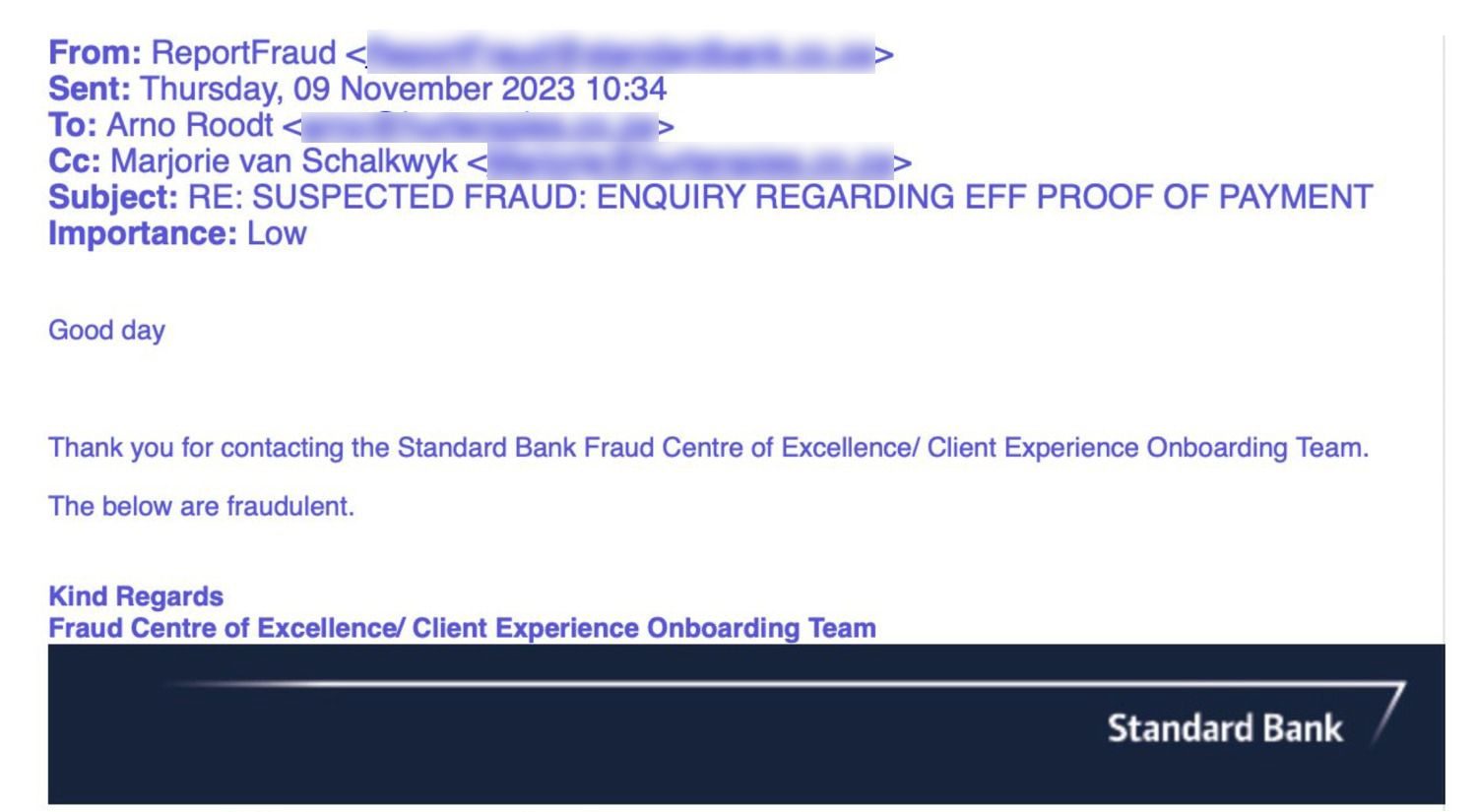 The Standard Bank Fraud Centre’s email to AfriForum’s attorneys at Hurter Spies Inc.
The Standard Bank Fraud Centre’s email to AfriForum’s attorneys at Hurter Spies Inc.
The email confirmed a telephonic conversation AfriForum’s attorneys at Hurter Spies Inc had on Wednesday at 1.21pm in which the bank’s representatives first conveyed the “fraudulent” finding, Kriel told Scorpio.
AfriForum’s bank account, held at Absa, did, however, reflect the two payments of R163,441.39 and R153,138.50, totalling R316,579.89.
AfriForum consequently came to the mistaken conclusion that the EFF had “doctored” the proof of payments and published an online press release headlined: “Falsified Documents: AfriForum exposes dodgy EFF payments”.
When Scorpio in collaboration with Jean le Roux from Digital Forensic Research Lab investigated, all the above-mentioned proof of payment documents created by the EFF did indeed raise red flags. The metadata looked suspicious, too, but none raised a flag so red and large as the dated list of directors and Standard Bank logo.
For control and to test our findings, this journalist generated a Standard Bank proof of payment from a private, individual Standard Bank account. The document was correct in appearance, with the latest Standard Bank logo along with the current list of directors.
For further control, Le Roux searched online for a proof of payment document created by a Standard Bank business account. The sending and receiving parties had no link to the EFF and AfriForum and it was therefore a true yardstick against which we could measure the veracity of the EFF documents. This document, created in February 2022 and uploaded by the Knysna Municipality, looked exactly the same as the EFF’s generated proof of payment document, with an outdated logo and list of directors.
The document was independent collaboration of the EFF’s version of events.
Le Roux said, “The likely situation is that Standard Bank used a different system to generate Business Online proof of payments and their non-commercial proof of payments. While the non-commercial proof of payments had their letterheads changed to reflect the new logo and board composition, this was not applied to the Business Online letterheads.”
EFF demands apology
In the meantime, the EFF reacted with noticeable alacrity and took the opportunity to prove itself innocent.
In less than 24 hours after AfriForum’s accusation, EFF lawyer Ian Levitt was instructed to send a severe letter to the civil rights organisation demanding an apology, failing which, legal steps would be taken. Aggrieved emails were predictably exchanged.
More instructive, though, was the redacted version of the EFF’s Standard Bank statements showing the payments made to AfriForum’s lawyers which Levitt sent to Scorpio.
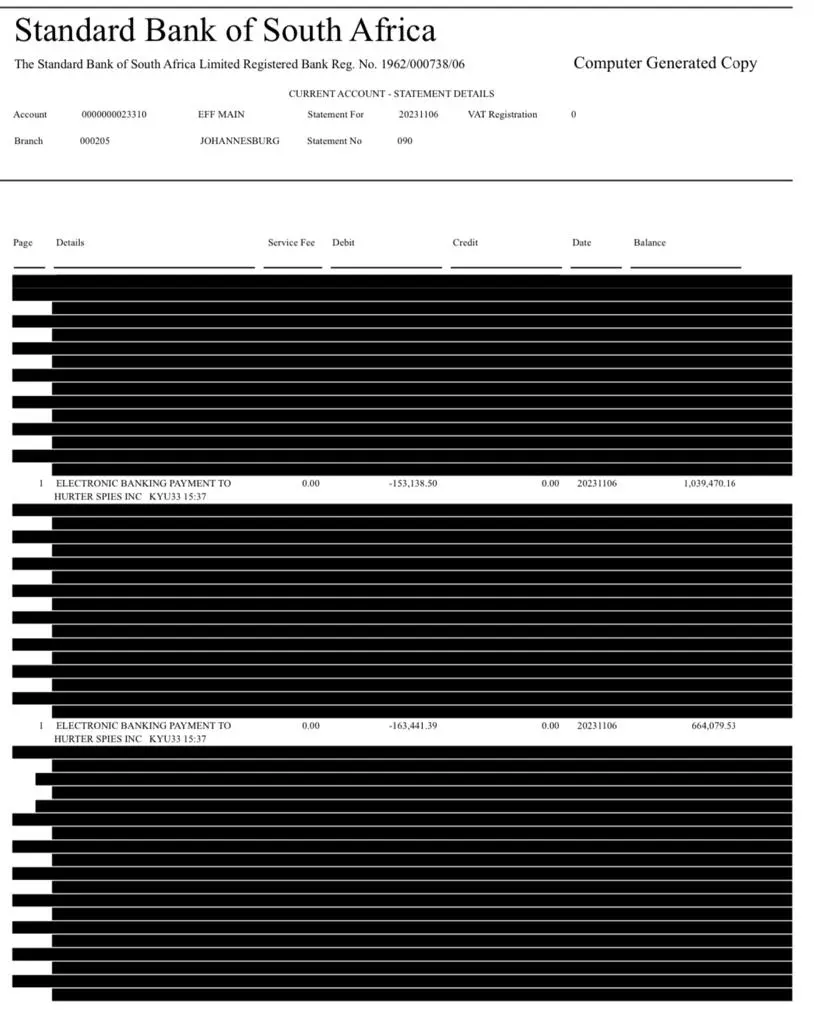 Extract from EFF bank account provided by Ian Levitt.
Extract from EFF bank account provided by Ian Levitt.
Levitt further forwarded emails which made it clear that Standard Bank’s system created and sent proof of payment documents, or “pay alerts”, to an EFF inbox labelled “statements”. From here the proofs of payment were sent to EFF treasurer Omphile Maotwe, who sent it to an attorney at Ian Levitt Attorneys.
These emails, read with the extracts of bank statements from the EFF and AfriForum, proved the EFF did pay AfriForum from the party’s main Standard Bank account.
The incident caused a stir in Standard Bank and a flurry of meetings with representatives of the EFF and AfriForum late last week and into the weekend. Just before midnight on Friday, the bank issued an apology to the EFF followed by another apology to AfriForum on Saturday afternoon.
The Standard Bank Fraud Centre, one of the bank’s crown jewels, was conspicuously absent in both apologies.
We publish Standard Bank’s full reaction below.
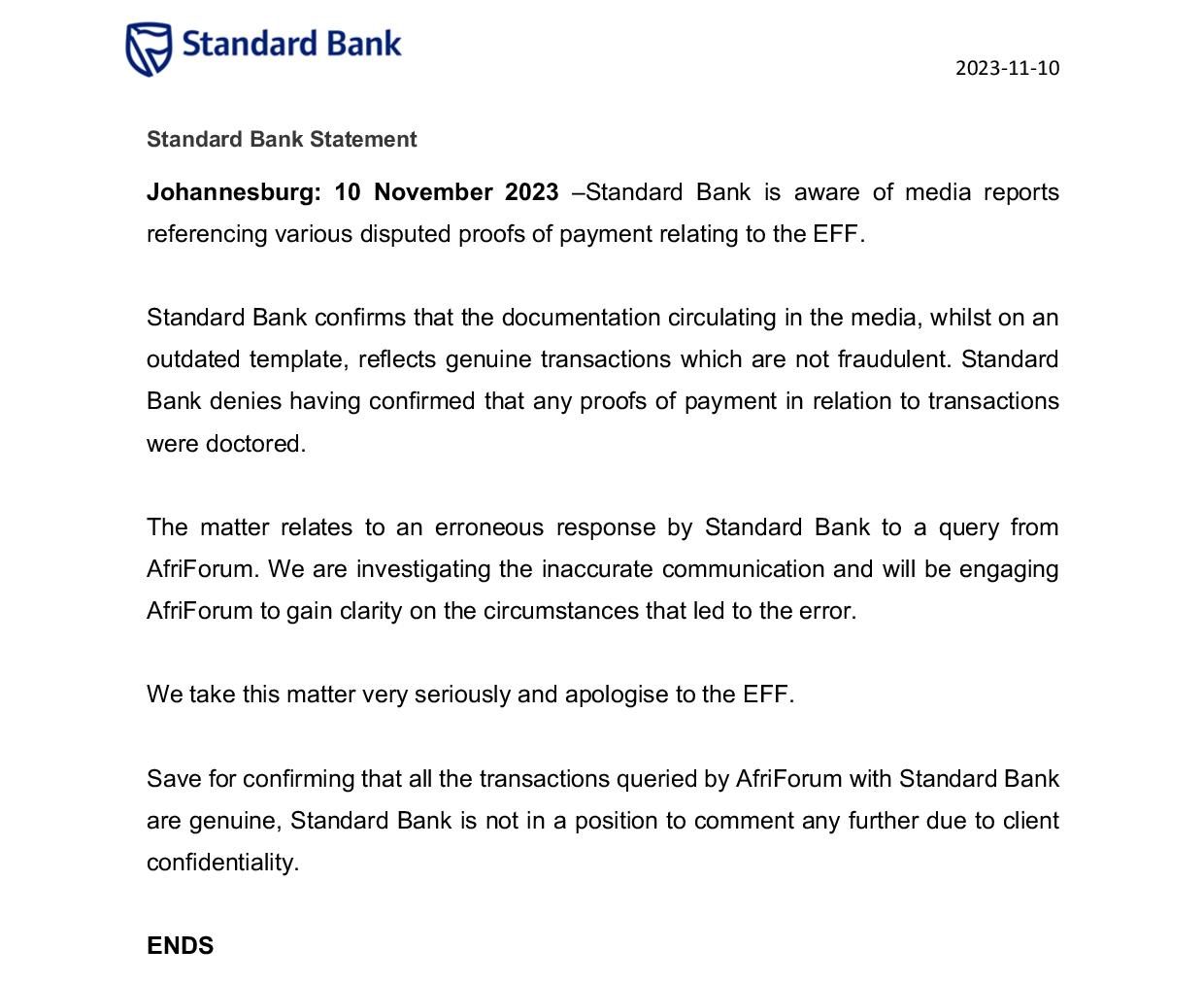
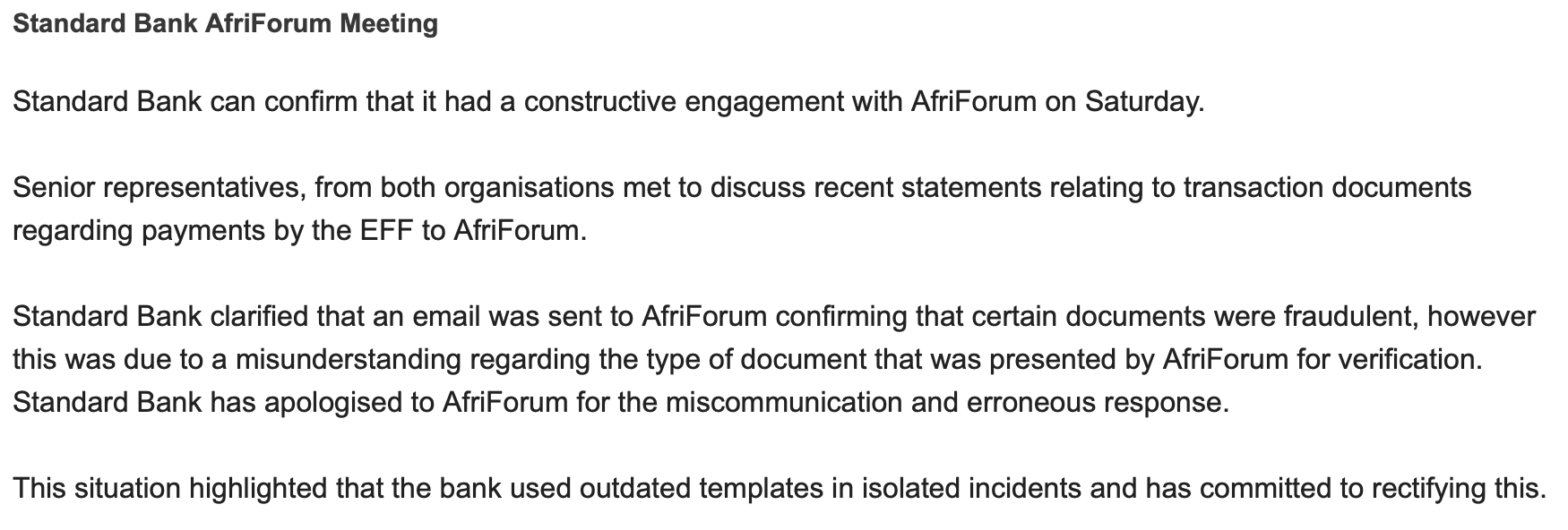 Standard Bank response after engagement with AfriForum.
Standard Bank response after engagement with AfriForum.
In his second letter to AfriForum, Levitt said the EFF demanded an apology from AfriForum and lawyers Hurter Spies Inc by 1pm on Monday, 13 November. Levitt described the organisation’s accusations as “defamatory” and denied that the defence of fair comment was applicable.
“One of the legal requirements of the fair comment defence is that the facts on which the fair comment is based must be true,” Levitt said.
He quoted from the judgment in the EFF’s disastrous loss in a defamation case brought against the party by former minister Trevor Manuel and said the EFF had learnt “through bitter experience” that you cannot claim your criticism is justified when your basic facts are wrong and you did nothing to verify their accuracy.
AfriForum has deleted from its website the offending press release accusing the EFF of criminality.
Kriel told Scorpio AfriForum was happy with Standard Bank’s apology “because it is important to state that we did not lie, but relied on Standard Bank’s Fraud Centre”.
AfriForum denied “any form of defamation, and if the EFF wishes to continue with their action, we will oppose it because we do not think they will be successful in the circumstances”. DM
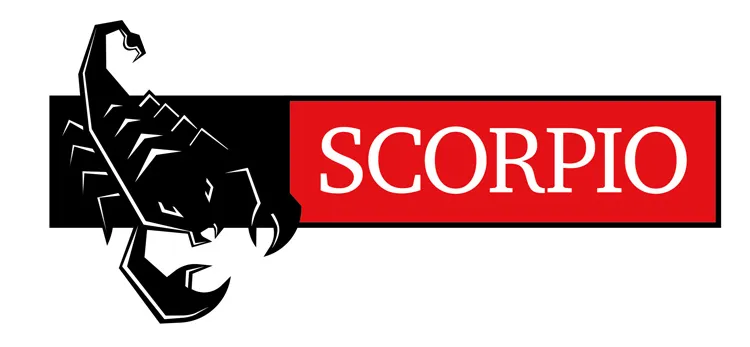




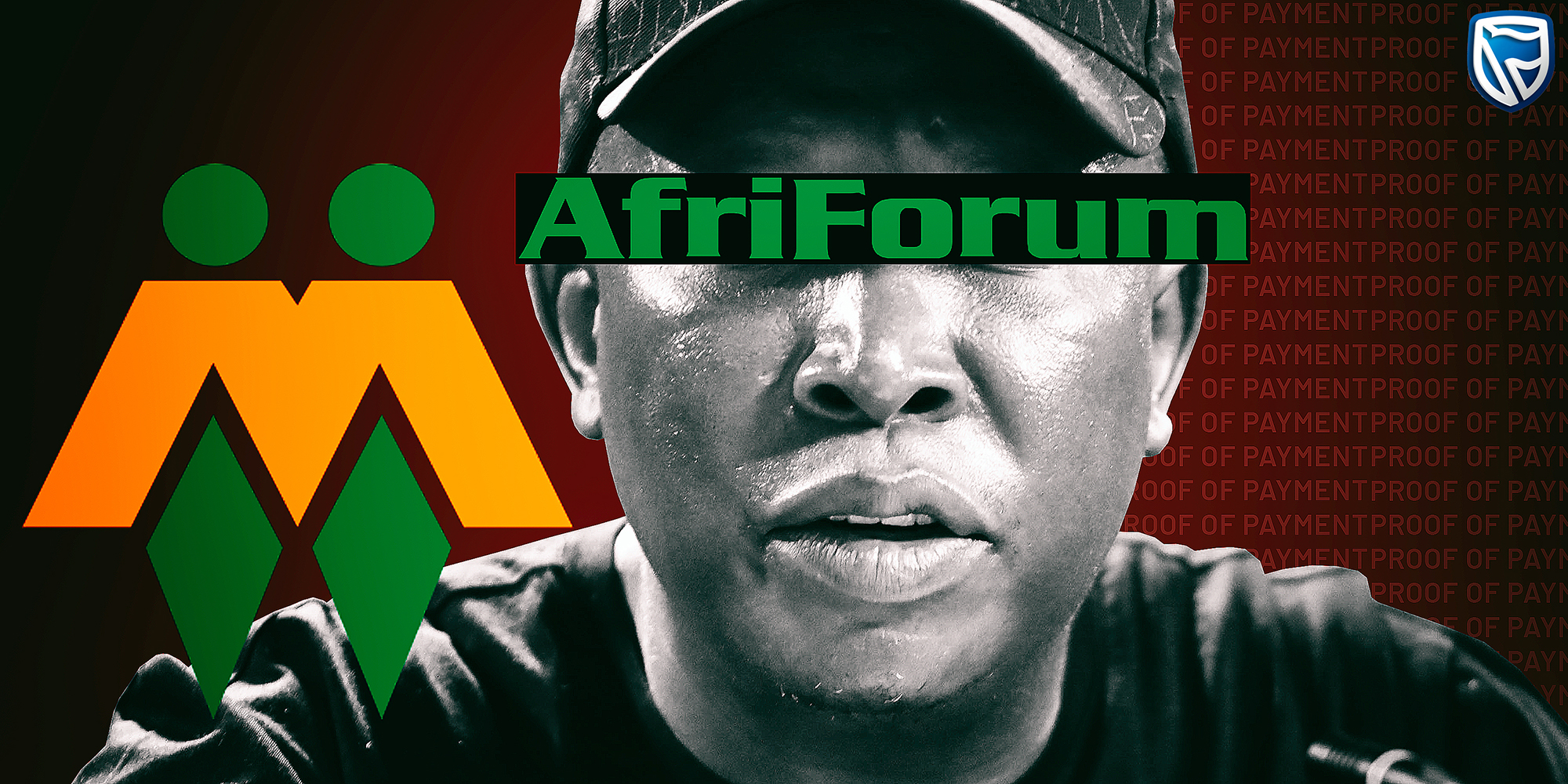 gyhhu
gyhhu 